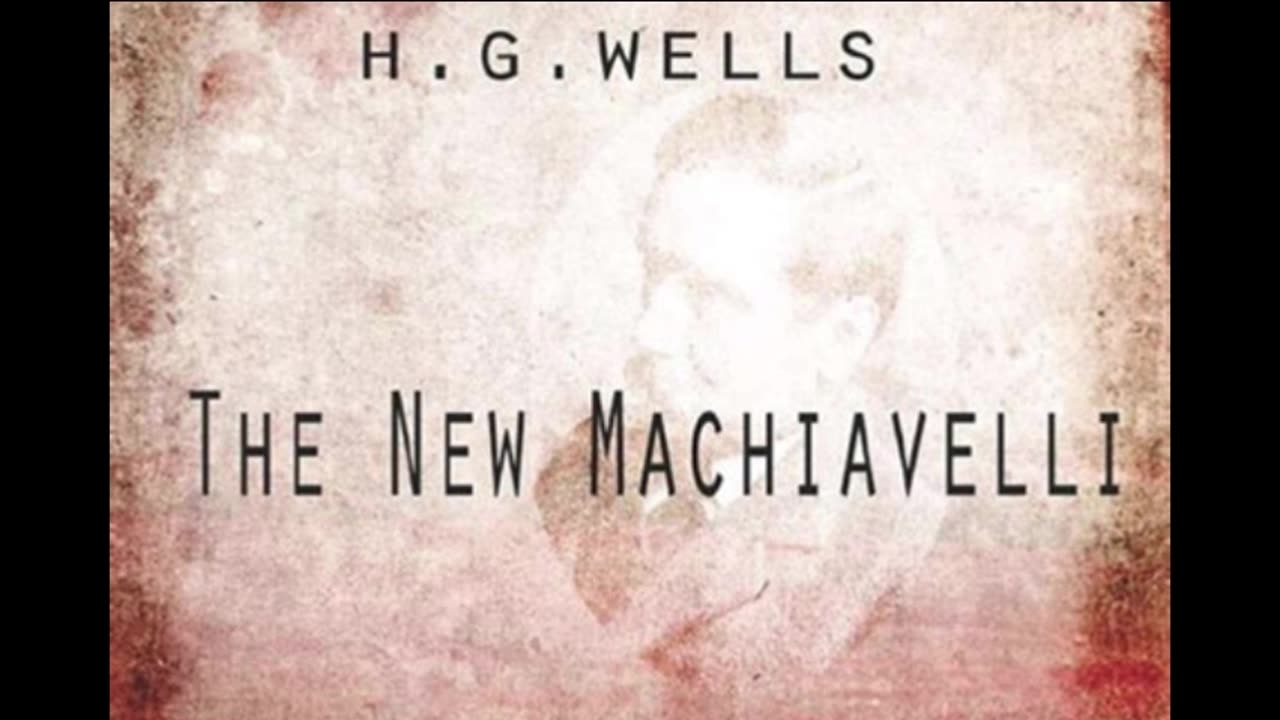Premium Only Content

The New Machiavelli by: H.G. Wells (1911)
The New Machiavelli is an intricate exploration of politics, personal ambition, and moral compromise, wrapped in the confessional narrative of Richard Remington, a charismatic and ambitious politician. Published in 1911, the novel stands out in H.G. Wells' oeuvre as a sharp critique of the political system of Edwardian Britain, juxtaposed against the personal struggles and failings of its protagonist. The narrative's confessional style allows Wells to intertwine political commentary with personal reflection, providing a deeply introspective examination of both individual and societal flaws.
The title, The New Machiavelli, is a direct reference to Niccolò Machiavelli’s seminal political treatise The Prince, which is renowned for its analysis of power dynamics and the ethics of political leadership. Wells uses the protagonist, Remington, to examine these same dynamics in a modern British context, suggesting that the pragmatism and cold calculations Machiavelli advocated in Renaissance Italy are still relevant—and problematic—in early 20th-century British politics.
Structure and Style: The novel is presented as a retrospective memoir, with Remington detailing his rise through the British political system and the moral decisions that ultimately led to his downfall. This structure provides an intimate glimpse into the character’s psychology and ambitions, making the novel as much a personal study as it is a political critique. The narrative tone is reflective, with Remington dissecting his life choices, from his initial idealism to the compromises he makes as his political career progresses. This intimate, confessional style gives the novel a sense of immediacy and personal relevance, as Remington’s regrets and rationalizations are laid bare.
Wells cleverly parallels Remington’s personal journey with his evolving political philosophy. Early in the novel, Remington is presented as an intellectual and reformist, committed to reshaping British society along progressive lines. However, as he climbs the political ladder, he becomes increasingly embroiled in the pragmatism and compromises necessary to sustain power. His extramarital affair with Isabel Rivers becomes symbolic of the broader moral failings that characterize his political career—he sacrifices his ideals and personal integrity in pursuit of both sexual and political fulfillment.
Themes:
Central to the novel is the conflict between Remington’s youthful idealism and the cold pragmatism he adopts as he ascends in the political world. Wells critiques the way in which political systems, particularly in Britain, erode personal integrity and force individuals to make moral compromises. Through Remington’s journey, Wells explores how even the most noble aspirations can become corrupted by the harsh realities of political life.
The novel is also deeply concerned with the tension between personal desires and public responsibilities. Remington’s affair with Isabel Rivers serves as the focal point for this tension, illustrating how private indiscretions can have profound public consequences. Wells suggests that political leaders are often held to impossible standards, expected to maintain both public virtue and personal discipline, leading to inevitable failures.
The New Machiavelli provides a scathing critique of the British political establishment, particularly the Liberal Party, which Remington represents in the novel. Wells portrays the political class as hypocritical, self-serving, and out of touch with the needs of ordinary people. He is particularly critical of the way political institutions resist meaningful reform, trapping well-meaning individuals like Remington in a system that rewards compromise over principle.
The novel’s portrayal of marriage, sexual relationships, and the roles of women is also significant. Wells uses the characters of Remington’s wife, Margaret, and his lover, Isabel, to explore the limitations placed on women in Edwardian society. Margaret represents the idealized, supportive wife, while Isabel embodies passion and rebellion against societal norms. Through these relationships, Wells critiques the societal expectations of marriage and fidelity, particularly in the context of political life.
The novel was controversial at the time of its publication because of its perceived autobiographical nature. Many contemporary readers saw Richard Remington as a thinly veiled version of Wells himself, and Isabel Rivers as a fictionalized representation of Amber Reeves, with whom Wells had an affair. The public scandal surrounding Wells’ personal life—he was married at the time—added a layer of real-world drama to the novel, making it a subject of much discussion. While Wells denied that The New Machiavelli was directly autobiographical, the parallels between his life and the novel’s plot are undeniable.
Upon its release, The New Machiavelli caused a stir, not only because of its portrayal of extramarital affairs but also due to its perceived attacks on prominent political figures of the day, particularly members of the Fabian Society, with whom Wells had a contentious relationship. The novel’s depiction of British politics was seen as cynical and critical of the very institutions that Wells had once supported. Despite this, the novel was widely read and discussed, cementing Wells’ reputation as a sharp social critic.
While the novel’s scandalous elements attracted much attention, The New Machiavelli has since been recognized for its insightful exploration of the corrupting influence of power and the inevitable compromises that political leaders must make. Its blend of personal and political narrative, combined with its psychological depth, has made it a key work in Wells’ body of fiction.
The New Machiavelli is often seen as Wells’ most explicitly political novel, blending his intellectual critique of the British political system with his personal experiences and observations. The novel’s exploration of the moral and ethical challenges faced by those in power remains relevant today, offering timeless insights into the nature of political leadership. It stands as an important text in the tradition of political fiction, alongside works like Disraeli’s Coningsby and Trollope’s Palliser novels, but with a more modern, critical edge.
About the Author:
H.G. Wells (Herbert George Wells, 1866-1946) was an English writer, historian, and social commentator, widely regarded as one of the most influential authors of the early 20th century. Best known for his pioneering works of science fiction, such as The War of the Worlds, The Time Machine, and The Invisible Man, Wells also wrote extensively on social, political, and philosophical topics.
Wells was a committed advocate for social reform and was deeply involved in the intellectual and political debates of his time. He was a member of the Fabian Society, a British socialist organization that aimed to advance the principles of democratic socialism through gradual reforms rather than revolution. His interest in social issues and his belief in the power of science and education to improve society are reflected in many of his works, including The Open Conspiracy.
Wells was a member of the Fabian Society, a British socialist organization advocating for gradual, democratic reforms rather than revolutionary change. He engaged in political debates and was known for his radical views on social reform, class inequality, and the future of human society. Although he supported socialism, he was often critical of political parties and institutions, which he felt were too slow or corrupt to bring about real change.
Wells’ personal life was often as controversial as his writings. He had multiple affairs, including one with feminist and author Amber Reeves, which heavily influenced The New Machiavelli. The affair strained his relationship with the Fabians, and this personal experience is mirrored in the novel’s exploration of sexual morality, personal ambition, and political pragmatism.
H.G. Wells is widely regarded as one of the founding fathers of science fiction, but his contributions to literature extend far beyond that genre. His explorations of political, social, and philosophical issues influenced not only his contemporaries but also future generations of writers and thinkers. His predictions about future technologies, warfare, and society were often uncannily accurate.
Wells was deeply influenced by Charles Darwin’s theory of evolution, which shaped his views on human nature, society, and progress. His writing style combined a fascination with science and the possibilities of the future with a deep skepticism of human nature and institutions. His works often reflect his belief that human progress requires a balance between scientific advancement and ethical responsibility.
-
 4:09:37
4:09:37
Deus Meum Que Jus
15 days ago"Propaganda" by: Edward Bernays (1928)
2922 -
 LIVE
LIVE
Anvilight
4 hours agoFortnite | Saturday Morning Stream! | Creator Program Day #22
292 watching -
 14:16
14:16
Talk Nerdy Sports - The Ultimate Sports Betting Podcast
2 hours ago3/22/25 - March Madness: Who Wins Today? Vas & Riste Pick Every Game!
13.9K1 -
 3:02:33
3:02:33
RG_GerkClan
5 hours ago🔴LIVE - Lets Dominate this Weekend - Escape From Tarkov - Gerk Clan
29.6K2 -
 4:59:23
4:59:23
SoundBoardLord
5 hours ago90's Saturday Morning Cartoons, Chill Vibes & Great Conversations
22K -
 13:55
13:55
ThinkStory
1 day ago107 Hidden Clues & Details You Missed In Severance Season 2!
24.2K2 -
 24:54
24:54
CatfishedOnline
1 day agoVictim will NOT leave her Romance Scammer
21.4K5 -
 12:49
12:49
MTNTOUGH Fitness Lab
1 day agoNick Jones: Subzero Saunas and Sucking at Sports | MTNTOUGH Lab Visit
22.7K1 -
 29:47
29:47
TampaAerialMedia
5 hours ago $0.99 earnedUpdate SIESTA KEY, FL 2025 - Come Back after Hurricanes Helene & Milton
20.9K2 -
 29:36
29:36
Uncommon Sense In Current Times
21 hours ago $1.14 earnedMiraculous Healings: Faith or Science? | Billy Hallowell
22.9K4